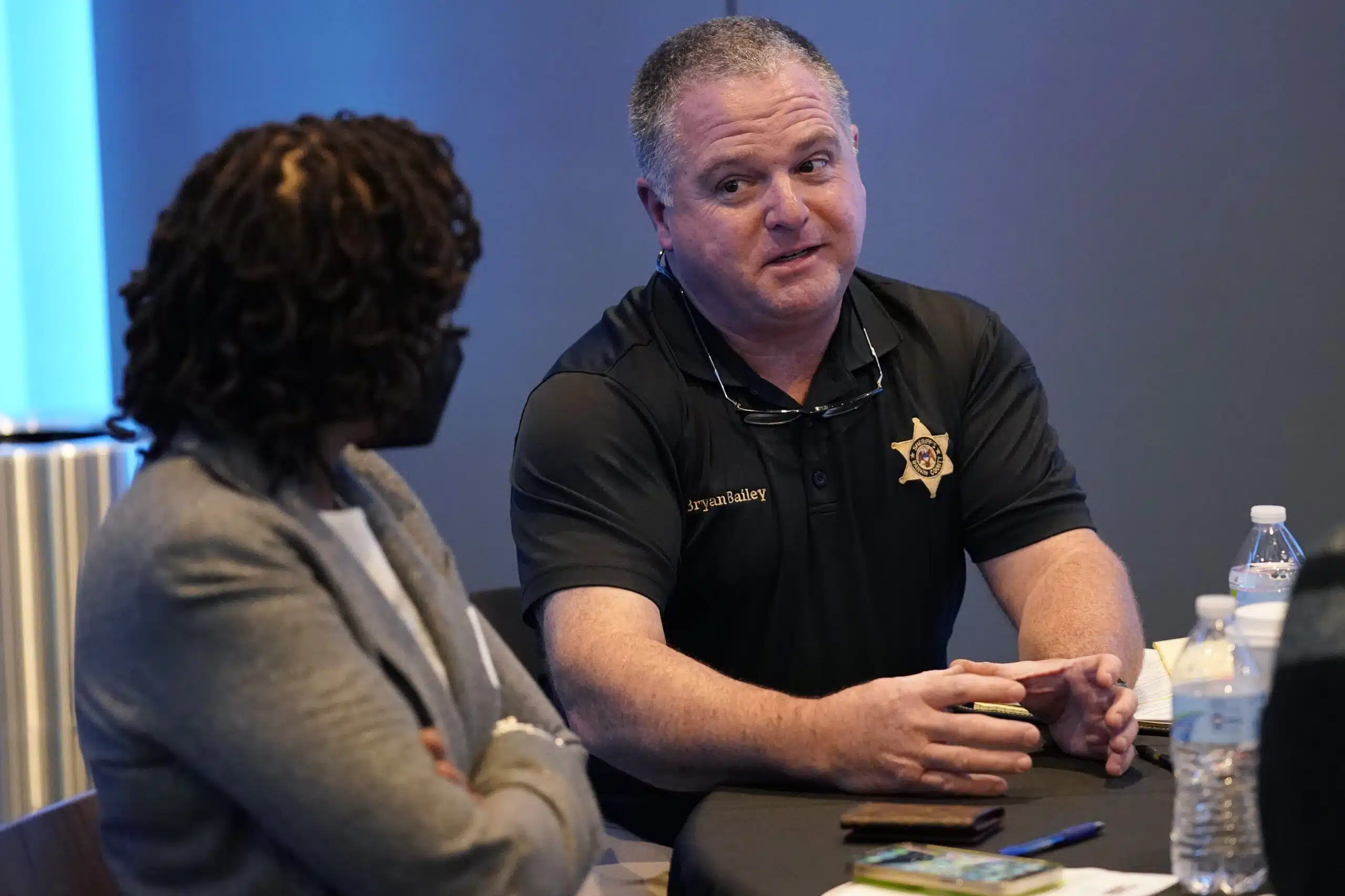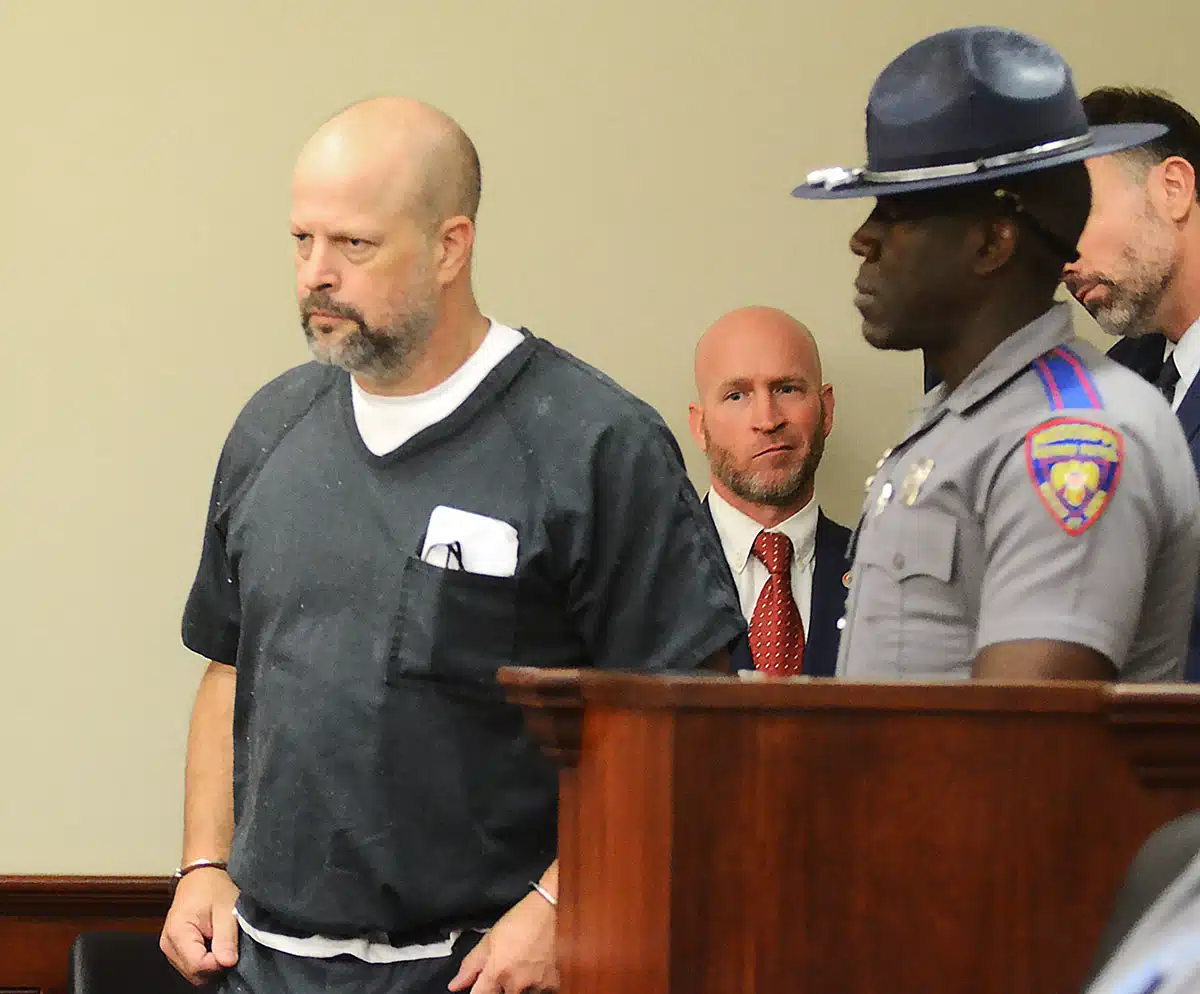Mississippi Today
How a ‘Goon Squad’ of Deputies Got Away With Years of Brutality

Brian Howey and Nate Rosenfield investigated dozens of arrests made by Rankin County deputies to report this article, which is part of a series by The Times’s Local Investigations Fellowship examining the power of sheriffs’ offices in Mississippi.
For nearly two decades, a loose band of sheriff’s deputies roamed impoverished neighborhoods across a central Mississippi county, meting out their own version of justice.
Narcotics detectives and patrol officers, some who called themselves the Goon Squad, barged into homes in the middle of the night, accusing people inside of dealing drugs. Then they handcuffed or held them at gunpoint and tortured them into confessing or providing information, according to dozens of people who say they endured or witnessed the assaults.
They described violence that sometimes went on for hours and seemed intended to strike terror into the deputies’ targets.
In the pursuit of drug arrests, deputies of the Rankin County Sheriff’s Department shocked Robert Jones with a Taser in 2018 while he lay submerged in a flooded ditch, then rammed a stick down his throat until he vomited blood, he said.
During a raid the same year, deputies choked Mitchell Hobson with a lamp cord and waterboarded him to simulate drowning, he said, then beat him until the walls were spattered with his blood. That raid took place at the home of Rick Loveday, a sheriff’s deputy in a neighboring county, who said he was dragged half-naked from his bed at gunpoint, before deputies jabbed a flashlight threateningly at his buttocks and then pummeled him relentlessly.
The string of violence might have continued unchecked if not for one near-fatal raid in January.
According to a Justice Department investigation, deputies broke into the home of two Black men, Michael Jenkins and Eddie Parker, shocked them with Tasers and threatened to rape them. Deputy Hunter Elward shoved the barrel of a gun into Mr. Jenkins’s mouth, not realizing a bullet was in the chamber, and pulled the trigger. Mr. Jenkins was grievously injured, the incident was thrust into the national spotlight, and in August five deputies and a police officer pleaded guilty to criminal charges.

Rankin County Sheriff Bryan Bailey said in a press conference this summer that he was stunned to learn of the “horrendous crimes” committed by his deputies. “Never in my life did I think it would happen in this department.”
But an investigation by The New York Times and the Mississippi Center for Investigative Reporting at Mississippi Today reveals a history of blatant and brutal incidents stretching back to at least 2004.
Reporters examined hundreds of pages of court records and sheriff’s office reports and interviewed more than 50 people who say they witnessed or experienced torture at the hands of the Rankin County Sheriff’s Department. What emerged was a pattern of violence that was neither confined to a small group of deputies nor hidden from department leaders.
Many of those who said they experienced violence filed lawsuits or formal complaints, detailing their encounters with the department. A few said they had contacted Sheriff Bailey directly, only to be ignored.
The Times and Mississippi Today identified 20 deputies who were present at one or more of the incidents — many assigned to narcotics or the night-shift patrol — who were present at one or more incidents.
Christian Dedmon, Rankin’s former narcotics detective, was involved in eight incidents, department records show. Also present for at least one arrest: former Undersheriff Paul Holley and former Deputy Dean Scott, who is now police chief in Pearl, Miss.
Brett McAlpin, former chief investigator for the department, was involved in at least 13 of the arrests and was repeatedly described by witnesses as leading the raids. He was named in at least four lawsuits and six complaints going back to 2010. Even so, Sheriff Bailey named him investigator of the year in 2013. This year, he pleaded guilty to criminal charges for his role in the January raid.

Taken together, the reporting shows how Rankin deputies were allowed to operate with impunity, while racking up arrests for relatively minor drug infractions and leaving entire neighborhoods in fear of violent raids.
Among the dozens of allegations reviewed, The Times and Mississippi Today were able to corroborate 17 incidents involving 22 victims based on witness interviews, medical records, photographs of injuries and other documents.
In nearly half the cases, Taser logs obtained from the department through a public records request helped corroborate the allegations. Electronically recorded dates and times of Taser triggers lined up with witness accounts and suggested that deputies repeatedly shocked people for longer than is considered safe.
The Taser logs also suggest that the scope of the violence may extend much farther.

At least 32 times over the past decade, Rankin deputies fired their Tasers more than five times in under an hour, activating them for at least 30 seconds in total — double the recommended limit. Experts in Taser use who reviewed the logs called these incidents highly suspicious.
“This is not typical Taser use,” said Seth Stoughton, faculty director of the Excellence in Policing & Public Safety program at the University of South Carolina. “There’s just no justification for that.”
It is impossible to tell from the logs alone whether a series of shocks were aimed at one target, and whether they all made contact. Incident reports by the deputies offer little clarity, because in nearly every case they failed to mention that a Taser was used at all.
Over the past year, The Times and Mississippi Today have investigated how powerful sheriffs in rural Mississippi have dodged accountability in the face of misconduct allegations. The reporting exposed numerous sexual abuse accusations against two sheriffs in counties near Rankin, along with evidence that Sheriff Bailey obtained subpoenas to surveil his girlfriend’s phone calls.
Sheriff Bailey has faced increased scrutiny since the Justice Department began to investigate his deputies’ conduct this year, and the NAACP and local activist groups have called for his resignation. After 12 years as sheriff, he was re-elected in November when he ran unopposed.
The deputies accused of being involved in violent arrests declined to comment or did not respond to repeated requests for interviews.
It is not always clear what actions individual deputies took during the incidents. Witnesses often did not know their names and many of the deputies did not wear uniforms or name tags during the raids.
Jason Dare, a lawyer for the department, declined to comment on The Times and Mississippi Today’s findings.
During a brief phone interview on Sunday, Sheriff Bailey repeatedly declined to comment. Told that several high-ranking deputies were involved in arrests that had sparked accusations of brutal treatment, he said, “I have 240 employees, there’s no way I can be with them each and every day.”
On Tuesday, the department announced that it had updated its internal policies and that deputies would receive training on federal civil rights laws.
A statement from the department that referred to the January assault without acknowledging a broader pattern said, “Even though the prior actions were abnormal and extreme, we will make every effort to ensure that they do not occur in the future.”

New Problems, Old Tactics
For most of its history, Rankin County was a rural area dominated by farmland and forests.
That began to change when white flight reached the capital city of Jackson in the 1960s and Rankin’s fields gave way to subdivisions and strip malls.
But tucked among the stately homes and manicured lawns, some of the county’s most impoverished residents live in run-down trailers and makeshift shacks, a few without running water or electricity.
These neighborhoods were hit hard in the early 2000s as meth — cheap, highly addictive and easy to manufacture in isolated places — spread across rural America like wildfire.
Local sheriffs, even in small departments, set up special narcotics units and joined state and federal task forces in the War on Drugs. The Rankin County Sheriff’s Department responded by targeting low-income communities and policing them relentlessly.
In an area called Robinhood, residents said home raids became routine and it felt as if they couldn’t go to the corner store without being stopped and searched.
“Once they start picking on you,” said a former resident, Matasha Harris, “they will not leave you alone.”
Though Rankin deputies appear to have targeted people based on suspected drug use, not race — most of their accusers were white — their tactics could have been pulled from the Jim Crow era, when sheriffs and their deputies harassed and beat Black Southerners and civil rights activists.
During that period, deputies coerced false confessions, sometimes using cattle prods or “the water cure”: pouring water into suspects’ nostrils until they complied.
Priscilla Perkins, co-president of the John & Vera Mae Perkins Foundation, a nonprofit based in Jackson, Miss., that promotes racial reconciliation, said the Goon Squad’s acts reminded her of the reign of terror against civil rights activists that often involved law enforcement officers.
“It’s the hidden shame of Mississippi and America,” she said. “People are still trying to cover it up.”
Among the officers of that era accused of beating Black residents was Lloyd Jones, a state trooper who would become sheriff in nearby Simpson County.
A Justice Department investigation long after his death found that he had bragged to a colleague about fatally shooting a Black man, Benjamin Brown, in the back during a 1967 standoff between police officers and civil rights protesters.

In 1970, Mr. Jones participated in the beating of the Rev. John Perkins in the Rankin County jail, which culminated with a deputy jabbing a fork up his nose, according to the pastor and witnesses who testified against the officers.
As sheriff, he gave Bryan Bailey his first job in law enforcement.
“He is on my life’s wall of gratitude and had a huge impact on who I am,” Sheriff Bailey wrote on Facebook in 2015. “Not a day goes by that I don’t think about him or recall something that he taught me.”
Sheriff Bailey called him a mentor. But years before, Simpson County residents had begun calling him something else: “Goon” Jones.

Scope of Abuse
It’s unclear when Rankin County deputies adopted their nickname, but last year, they ordered commemorative coins emblazoned with cartoonish gangsters and the words “Lt. Middleton’s Goon Squad.” Lt. Jeffrey Middleton was the squad’s supervisor. He is among the five deputies who pleaded guilty to criminal charges stemming from the January raid on Mr. Parker and Mr. Jenkins.
A Justice Department investigation this year found that Rankin County deputies chose the name Goon Squad “because of their willingness to use excessive force and not report it.”
The investigation found that Mr. McAlpin, along with a narcotics detective, Christian Dedmon, and Goon Squad members burst into Mr. Parker’s home, tortured and humiliated the men while demanding to know where drugs were, and then disposed of the evidence.
Across the 17 cases for which reporters found corroborating witnesses and evidence, accusers described similar tactics by deputies, almost always over small drug busts.
Deputies held people down while punching and kicking them or shocked them repeatedly with Tasers. They shoved gun barrels into people’s mouths. Three people said deputies had waterboarded them until they thought they would suffocate. Five said deputies had told them to move out of the county.
Many of the targets teetered on the edge of homelessness and were caught with a few grams of meth or with only drug paraphernalia — a glass pipe or used syringe. Several people sat in jail for days or weeks only to have their charges dropped.

The largest bust among the incidents examined was for a $420 heroin sale.
In 2018, a confidential informant arranged an $80 meth deal at Jerry Manning’s home. Mr. Manning, who denies being part of the sale, said he heard deputies burst into his trailer and scream his name.
When he went to investigate, deputies pinned him to the floor. They said they wanted to test their new Tasers on him to see which hurt more, he said.
“They got me in my private parts, they got me in my head,” Mr. Manning said. “They kept tasing and tasing and tasing.”
Taser logs indicate that two of the nine deputies involved that night, James Rayborn and Cody Grogan, together triggered their Tasers at least 15 times during the two-and-a-half-hour raid.
As the deputies ransacked his home looking for drugs, Mr. Manning said, they wrapped a pair of jeans around his head and punched him repeatedly in the face before using a blowtorch to melt a metal nutcracker handle onto his bare leg as he screamed. On Mr. McAlpin’s orders, Mr. Manning said, a deputy then forced him to sit, pulled a belt around his neck and yanked it upward, choking him until he believed he would suffocate.

Three other men in the trailer that night described violent attacks. Garry Curro, a 64-year-old Air Force veteran, said deputies handcuffed, beat and shocked him. Adam Porter says Mr. McAlpin threw him into a glass mirror, then took Mr. Porter’s pocketknife and sliced his pants to ribbons, demanding to know where the drugs were. Mr. Manning’s roommate, James Lynch, said Mr. McAlpin dragged a blowtorch flame across his feet while interrogating him.
People’s accounts of the raids shared striking similarities, beyond the patterns in the violence.
At least 12 of the 17 cases began as Mr. Manning’s did, with a suspect being set up by a confidential informant, someone the deputies had persuaded to stage a drug buy while they waited nearby.
In six cases, people said deputies threatened to continue assaulting them until they disclosed either the name of a drug dealer or the location of drugs. Five people said the deputies ransacked their kitchens and destroyed their food or used it to humiliate them — smashing a cake into a man’s face before arresting him, dumping flour and rice onto a kitchen floor, pouring milk into a freshly cooked dinner. Every Black accuser said deputies had hurled racial slurs at them.
Most of the targets were men in their 30s or 40s with a history of drug use. But in 2009, Mr. McAlpin knocked out 19-year-old Christopher Hillhouse’s tooth with a Maglite, he and his mother say. The next year, deputies beat and shocked Dustin Hale, then 17, until he urinated on himself while his girlfriend watched, he said. When his mother and grandmother went to the county jail to pick him up, they said, they hardly recognized him through the bruises and swelling.

The story of Jeremy Travis Paige, who was targeted in 2018, fits a typical pattern described by the accusers.
Mr. Paige, a 41-year-old with several arrests, was pulling up to his home in a working-class neighborhood outside Jackson when he realized deputies were there waiting for him, he said.
He drove away, hoping they wouldn’t notice. But Mr. McAlpin chased him and pulled him over, then deputies beat him unconscious in the intersection, Mr. Paige alleged in a lawsuit against the county.
The suit claimed that he regained consciousness as the deputies dragged him, handcuffed, into his home. Mr. McAlpin and another deputy then pummeled him in the living room for nearly an hour, according to Mr. Paige and a witness who spoke on the condition of anonymity, fearing retribution from the deputies.
In interviews, Mr. Paige said the deputies pulled him into his roommate’s bedroom and sat him upright on the bed, where he felt someone press a knee into his back and stretch a washcloth across his mouth. Then, he said, deputies poured gallon after gallon of water over his face. As he struggled to breathe, he said, one of them pressed a lit cigarette into his thigh.
All the while, they shocked his groin intermittently with Tasers, Mr. Paige said. Taser logs show that one of the four deputies who reported being at the scene triggered his Taser during the arrest.

Three people, including Mr. Paige, said they had been shocked not only with gun-shaped Tasers — the type issued by the department — but also with small, rectangular ones, suggesting that some deputies used personal stun guns that were not being tracked.
“They had the devil in them,” Mr. Paige said. “I thought they was going to kill me.”
Deputies ordered him to send Facebook messages to friends asking to buy drugs. He struck out, and the deputies took him to jail.
Before leaving, they stuffed the blood- and water-soaked bedding in trash bags and removed them from the house, Mr. Paige said.
The next day, when Mr. Paige was in jail, his son Trace visited the house. He found evidence of the violence, he said, including a bent bed frame where his father had been held down by deputies and a puddle of blood on the floor.
Pictures taken by Mr. Paige’s roommate show the bed stripped of linens and blood spattered on the wall.
Mr. McAlpin wrote in his report that deputies restrained Mr. Paige after he tried to kick them during the arrest, but the detective did not mention the use of Tasers or other force that might explain the blood.
During Mr. Paige’s trial for drug sale charges, Mr. McAlpin testified that deputies might have injured Mr. Paige when they pulled him out of his car, because he was resisting. He denied hurting Mr. Paige in his home.
Mr. Paige was sentenced to five years in prison. When he sued the sheriff’s department, no lawyer would take his case and he resorted to representing himself. He wrote a letter to the judge explaining that he had only a seventh-grade education.
“I don’t know how to present big words or anything like that,” he wrote. “But I do know the truth.”
After he missed several court deadlines, the judge dismissed his case.

Who Knew
Over the years, more than a dozen people have directly confronted Sheriff Bailey and his command staff about the deputies’ brutal methods, according to court records and interviews with accusers and their families.
At least five people have sued the department alleging beatings, chokings and other abuses by deputies associated with the Goon Squad.
The department settled two of those cases. Two others, including Mr. Paige’s, were dismissed over procedural errors by accusers representing themselves.
But the mounting allegations signaled that something was profoundly wrong in the narcotics unit of Sheriff Bailey’s department.
Mr. McAlpin, the department’s former chief investigator who led most of the raids reviewed by reporters, was involved in at least four arrests that prompted lawsuits, court records show.

According to one suit that was settled, Mr. McAlpin kicked 19-year-old Brett Gerhart in the face and pressed a pistol to his temple in 2010 during a mistaken raid at the wrong address. In a 2012 case, tossed out because of missed court deadlines, Gary Michael Frith claimed that he had been beaten and choked in the back of a squad car during a drug bust; records show that Mr. McAlpin was one of the arresting officers.
Mr. McAlpin also figured prominently in complaints lodged with the department. Seven people told reporters they had mailed letters, filed formal complaints or called the sheriff personally to tell him about the abuse they experienced.
Joshua Rushing said he wrote several letters to the department in 2020, after Mr. McAlpin and Mr. Dedmon drove him to an isolated dead-end road and shocked and beat him. He said he never heard back.
Nicole Brock said that when she went to the sheriff’s office to submit a formal complaint against Mr. McAlpin for ransacking her car during a search, he tore up the form, threw it in the garbage and arrested her for a syringe he had found during the car search.
Ms. Brock said she left several messages on Sheriff Bailey’s office phone to report the deputy’s behavior, but he never returned her calls.
Mr. Dare, the department lawyer, declined to provide copies of complaints, saying they were considered personnel records protected by state law. When asked to confirm the existence of the seven complaints described by accusers, he said he could not immediately provide it.
Chuck Wexler, executive director of the Police Executive Research Forum, said this long list of complaints and lawsuits should have prompted investigations by the sheriff.
“If you’re getting multiple complaints about the same officers, from different sources, that’s a red flag,” he said. “If you don’t do anything about it, you’re in denial.”
Despite the allegations against him, Mr. McAlpin continued to rise through the ranks of the department, winning Investigator of the Year and eventually being promoted to the top investigator position.

Until this year, the Rankin County Sheriff’s Department did not have anyone assigned full time to handle complaints. Instead, supervisors were responsible for investigating the deputies they oversaw, according to four former employees who spoke on the condition of anonymity because they feared retribution from the department.
Among those supervisors were Mr. McAlpin and Lieutenant Middleton, who both pleaded guilty in August for their roles in the assault of Mr. Jenkins and Mr. Parker.
On Tuesday, Sheriff Bailey announced that the department would allow residents to file complaints against deputies on the department’s website.

Beyond the lawsuits and complaints, there were other obvious signs of the violence, including injuries that would have been visible to jail workers and court officials who saw the injured shortly after their encounters.
Hospital records show that Mr. Hobson was treated for a gash over his eye after a 2018 raid in which he says deputies waterboarded him and punched him repeatedly. His face is bandaged in his jail booking photo.
Robert Jones, the man who said deputies rammed a stick down his throat, arrived at the jail with a swollen and mud-streaked face after deputies beat him and threw him into a ditch.
Many of the mug shots from the Rankin County jail feature bandaged faces, swollen cheeks and black eyes associated with drug-related arrests.
But the most glaring evidence of the violence inflicted by deputies has been collecting in the department’s computer files for more than two decades.
The Taser Logs
Every time a Taser is fired, the device keeps a record of it. In Rankin County, deputies upload this data to a computer, compiling detailed departmentwide logs that allow supervisors to monitor deputy Taser use.
The data, reviewed by The Times and Mississippi Today, contained tens of thousands of Taser triggers stretching back 24 years.
The logs supported the accounts of nine people who described being shocked by deputies while handcuffed or held down. In all but three of these cases, the deputies did not report their Taser use, violating department policy.
“I don’t believe I’ve ever come across an agency in which it would be acceptable for an officer to deploy a Taser and not report it in some way,” said Ashley Heiberger, a retired officer and an expert in police use of force.
After several studies linking prolonged Taser exposure to severe medical problems and even death, the Police Executive Research Forum developed national guidelines advising against shocking a person for more than 15 seconds during an encounter.
The logs contain dozens of instances of Tasers being fired for at least double the recommended time limit over the course of an hour. In April 2016, a device assigned to a deputy who participated in Goon Squad raids was triggered nine times in four minutes, delivering 31 seconds of current.
Several experts in police use of force said the logs showed abnormal Taser use that was hard to explain. Seth Stoughton, from the University of South Carolina, said the frequency of the deputies’ Taser triggers suggested they were not using the weapons for their intended purpose: to quickly subdue a combative person.
“It just doesn’t suggest that the Taser is actually being used to induce compliance,” he said.

By comparing the logs to department records, reporters identified four people who claim they were at the receiving end of Taser shocks recorded in the data.
In 2016, Deputy James Rayborn fired his Taser for 20 seconds over the course of 20 minutes during a raid of Samuel Carter’s home.
Mr. Carter, a 64-year-old Army veteran, had had previous run-ins with Rankin sheriff’s deputies over alleged drug use. On the night of the raid, he said, deputies dragged him to his bedroom, shocked him and demanded that he open a safe where they expected to find drugs and cash.
Instead, deputies found a tub of cake frosting he had stashed in the safe to hide from houseguests with a sweet tooth.
Mr. Carter said they became enraged and shocked him again until his leg began to bleed.
Down the hall, Christopher Holloway, a 26-year-old who had been helping Mr. Carter maintain his property, was beaten and shocked until he defecated on himself, he said. Then they dragged him outside and threatened to push him, handcuffed, into Mr. Carter’s pool.
Mr. Holloway and Mr. Carter were charged with paraphernalia and drug possession — Mr. Holloway for marijuana, Mr. Carter for several grams of methamphetamine.
Like many people targeted by Rankin deputies, Mr. Carter said the first raid was just the beginning. Three months later, deputies arrested him again, this time for drinking in front of his home, Mr. Carter said. He was arrested four more times over the next year, department records show, mostly for drug or paraphernalia possession.
Ballooning legal fees left Mr. Carter unable to pay his bills.
“They had the power,” he said. “And they used it.”

‘I Lost My Life’
The Goon Squad has left a long trail of shattered lives in its wake. Some people who said they were brutalized are jolted awake by nightmares after their encounters with deputies. Four said they fled the county for good. Several are serving lengthy prison terms.
In 2015, Ron Shinstock was struggling with a methamphetamine addiction, even as he raised a family with his wife and ran a mechanic shop with his brother.
Everything changed, he said, after Mr. McAlpin led a violent raid of his home, holding his children at gunpoint and forcing him to strip naked in his backyard. The arrest led to a 40-year prison sentence for a $260 meth sale within 1,500 feet of a church.
Mr. Shinstock’s wife left him. He is scheduled to be released in 2056, two months before his 82nd birthday.
“I lost my family, I lost my home,” Mr. Shinstock said. “I lost my life.”

Andrea Dettore, a former resident of Rankin County, witnessed deputies brutalize three people in two incidents. She said she was there in 2018 when the Goon Squad attacked Mr. Loveday, the former deputy, and Mr. Hobson.
During a raid on her own home in January, she said, she heard deputies beat her friend, Robert Grozier, behind a closed door, and saw a deputy, Christian Dedmon, shove a sex toy into his mouth, threatening to shock him with a Taser if he spat it out.
Ms. Dettore and Mr. Grozier were each fined several hundred dollars, and she has since left Rankin County. Mr. Hobson sat in jail for six months before his charges were dropped, and Mr. Loveday lost his job as a sheriff’s deputy. Court records show he was never convicted of a crime.
After Mr. McAlpin arrested Mr. Loveday and accused him of consorting with drug dealers, he ordered him to leave town. Mr. Loveday fled the state, fearing he would be targeted again. He couldn’t forget that night.
“If they did that to me, how many other people have they done it to?” he wondered.
Before he left Mississippi, Mr. Loveday said, he called Sheriff Bailey personally to warn him about his deputies’ behavior.
But Mr. Bailey wouldn’t listen, he said. He called Mr. Loveday a dirty cop and accused him of secretly recording the call.
Then, Mr. Loveday said, “He hung up on me.”
Jerry Mitchell, Ilyssa Daly, Eric Sagara and Irene Casado Sanchez contributed reporting. Kitty Bennett contributed research. This article was reported in partnership with Big Local News at Stanford University and supported in part by a grant from the Pulitzer Center.
This article first appeared on Mississippi Today and is republished here under a Creative Commons license.
Mississippi Today
Brain drain: Mother understands her daughters’ decisions to leave Mississippi
Editor’s note: This Mississippi Today Ideas essay is published as part of our Brain Drain project, which seeks answers to Mississippi’s brain drain problem. To read more about the project, click here.
Back when I was a kid in 1988, my mama and I had an argument about what I wanted to major in at college.
I had dreamed of being a journalist since the age of 8. To me, that meant that I was going to Ole Miss, which had the journalism department.
My mama said I could only go away from home to Ole Miss if I was going to major in law.
So I settled on going to Mississippi State University just down the road and majoring in communication. She told me I should major in engineering since that’s what State was known for.
I said, “That’s even dumber than me going to law school. I hate math.”
“Well, you could at least try,” she said.
I said no. Then she told me I was wasting my education and turned her back on me.
I get it. She knew and I knew that I couldn’t stay in Choctaw County where I was raised and earn a living with that degree. I would have to go somewhere else — probably to the Jackson metro area and work for Gannett or the Associated Press. Or to Memphis. Or Biloxi. Or even New Orleans. She never really forgave me for moving to the Jackson metro, working in my field and raising her grandchildren so far from her.
After a while, I got used to the pace of life around here. I knew I probably wouldn’t ever move anywhere else because I noticed that people who left Mississippi often came back, whether due to family obligations or a realization that “somewhere else” wasn’t quite all it was cracked up to be.
I also noticed that a lot of people played up how they were from Mississippi while making a very good living being someplace else. I decided I wanted to prove you could be from Mississippi, live in Mississippi, work in Mississippi and make something of yourself without leaving Mississippi.
But I noticed something else over the years, too. Most of the kids in Brandon dreamed of going off from home to cities like Atlanta, Nashville, Dallas, DC, New York or Orlando. They didn’t seem to have reasons — just a desire to get away from the state as fast as they could.
Then my three daughters and I started having conversations about what they wanted to major in when they went to college. My oldest wanted to be a chef. My middle one was undecided between chemical engineering and landscape architecture. And my youngest was fascinated with roads and bridges.
I was all too aware of what had happened in the job markets in Mississippi since I had come up. Companies closed operations in a globalized economy and fled to cheaper labor markets. The advent of the internet meant employers could hire from all over the world. Longtime business leaders retired and sold out to big corporations that reduced investments in local communities that had supported those businesses for decades and then complained that those towns didn’t offer enough amenities for their employees to want to relocate there.
But the reality really set in when my chef daughter chose her first internship — in historic Williamsburg, Virginia.
I would never have dreamed of driving that far from home to try out a place to work when I was her age. Then after her senior year, she interned at Walt Disney World and got hired full-time before the internship was over. She was off to live in Orlando where now with her husband and young son she’s creating community and loves going to work every day with a pretty enviable benefits package, too, a thing unheard of in the culinary world in Mississippi.
My middle one finally settled on chemical engineering and was picked for a co-op job in her first semester at age 18 at a company in Georgia. When she graduated four years later, we packed her off to Indiana for a research and development job, and she now lives in New Hampshire with her husband, making six figures a year at 26 years old and looking forward to partaking in the cultural offerings in New York City when she can.
The youngest is currently in college for civil engineering, and I’m bracing myself for the inevitable. She doesn’t want to work for state government, so she’s likely going out of state as well. Her comment about coming back to Jackson metro was the most damning of all. “There’s nothing to do here,” she says.
A lot of people ask me questions: How often do you see your daughters? How can you stand being so far from your grandson? Don’t they at least come home for Christmas?
The answer to all of those questions is that we do the best we can. We text, we message on Facebook, we talk on the phone at least once a week, every Sunday. We arrange visits; sometimes it’s us driving to them while other times they drive to us.
I can’t imagine making my children as miserable as my mom made me over my life choices. We are flexible, understanding, and very, very proud of our daughters, who are grappling with enough in their lives without us loading them down with guilt over when they are coming home.
The calculus may change in the future. We may have declines in health and need to move closer to one of our children if we need assistance. Or we may need to be in assisted living care here in Mississippi where such care may be marginally cheaper than wherever our girls land.
But I don’t wish our girls had settled for life in Mississippi.
What I wish is that Mississippi could find a way to live up to its potential — to be a place more worthy of my daughters’ loyalty, affections and investment in themselves.
Maybe it will be someday. I hope so, for all of our sakes.
Julie Liddell Whitehead lives and writes from Mississippi. An award-winning freelance writer, Julie covered disasters from 9/11 to Hurricane Katrina throughout her career. Her first book is “Hurricane Baby: Stories,” published by Madville Publishing. She writes on mental health, mental health education and mental health advocacy. She has a bachelor’s degree in communication, with a journalism emphasis, and a master’s degree in English, both from Mississippi State University. In 2021, she completed her MFA from Mississippi University for Women.
This article first appeared on Mississippi Today and is republished here under a Creative Commons Attribution-NoDerivatives 4.0 International License.
The post Brain drain: Mother understands her daughters' decisions to leave Mississippi appeared first on mississippitoday.org
Note: The following A.I. based commentary is not part of the original article, reproduced above, but is offered in the hopes that it will promote greater media literacy and critical thinking, by making any potential bias more visible to the reader –Staff Editor.
Political Bias Rating: Center-Left
This essay reflects a Center-Left perspective by focusing on social and economic challenges faced by Mississippi, such as brain drain, job market changes, and community decline. The tone is empathetic and advocates for investment in local opportunities and amenities to retain talent, aligning with progressive concerns about economic inequality and regional development. However, it remains largely personal and reflective rather than explicitly ideological or partisan. The article critiques systemic economic shifts without advancing a polarized political agenda, emphasizing hope for future improvement and a more supportive environment for young professionals.
Mississippi Today
After 30 years in prison, Mississippi woman dies from cancer she says was preventable
Behind Bars, Beyond Care:
A Mississippi Today investigation into suffering, secrecy and the business of prison health care
Susie Balfour, diagnosed with terminal breast cancer two weeks before her release from prison, has died from the disease she alleged past and present prison health care providers failed to catch until it was too late.
The 64-year-old left the Central Mississippi Correctional Facility in December 2021 after more than 30 years of incarceration. She died on Friday, a representative for her family confirmed.
Balfour is survived by family members and friends. News of her passing has led to an outpouring of condolences of support shared online from community members, including some she met in prison.
Instead of getting the chance to rebuild her life, Balfour was released with a death sentence, said Pauline Rogers, executive director of the RECH Foundation.
“Susie didn’t just survive prison, she came out fighting,” Rogers said in a statement. “She spent her final years demanding justice, not just for herself, but for the women still inside. She knew her time was limited, but her courage was limitless.”
Last year, Balfour filed a federal lawsuit against three private medical contractors for the prison system, alleging medical neglect. The lawsuit highlighted how she and other incarcerated women came into contact with raw industrial chemicals during cleaning duty. Some of the chemicals have been linked to an increased risk of cancer in some studies.
The companies contracted to provide health care to prisoners at the facility over the course of Balfour’s sentence — Wexford Health Sources, Centurion Health and VitalCore, the current medical provider — delayed or failed to schedule follow-up cancer screenings for Balfour even though they had been recommended by prison physicians, the lawsuit says.
“I just want everybody to be held accountable,” Balfour said of her lawsuit. “ … and I just want justice for myself and other ladies and men in there who are dealing with the same situation I am dealing with.”
Rep. Becky Currie, who chairs the House Corrections Committee, spoke to Balfour last week, just days before her death. Until the very end, Balfour was focused on ensuring her story would outlive her, that it would drive reforms protecting others from suffering the same fate, Currie said.
“She wanted to talk to me on her deathbed. She could hardly speak, but she wanted to make sure nobody goes through what she went through,” Currie said. “I told her she would be in a better place soon, and I told her I would do my best to make sure nobody else goes through this.”
During Mississippi’s 2025 legislative session, Balfour’s story inspired Rep. Justis Gibbs, a Democrat from Jackson, to introduce legislation requiring state prisons to provide inmates on work assignments with protective gear.
Gibbs said over 10 other Mississippi inmates have come down with cancer or become seriously ill after they were exposed to chemicals while on work assignments. In a statement on Monday, Gibbs said the bill was a critical step toward showing that Mississippi does not tolerate human rights abuses.
“It is sad to hear of multiple incarcerated individuals passing away this summer due to continued exposure of harsh chemicals,” Gibbs said. “We worked very hard last session to get this bill past the finish line. I am appreciative of Speaker Jason White and the House Corrections Committee for understanding how vital this bill is and passing it out of committee. Every one of my house colleagues voted yes. We cannot allow politics between chambers on unrelated matters to stop the passage of good common-sense legislation.”
The bill passed the House in a bipartisan vote before dying in the Senate. Currie told Mississippi Today on Monday that she plans on marshalling the bill through the House again next session.
Currie, a Republican from Brookhaven, said Balfour’s case shows that prison medical contractors don’t have strong enough incentives to offer preventive care or treat illnesses like cancer.
In response to an ongoing Mississippi Today investigation into prison health care and in comments on the House floor, Currie has said prisoners are sometimes denied life saving treatments. A high-ranking former corrections official also came forward and told the news outlet that Mississippi’s prison system is rife with medical neglect and mismanagement.
Mississippi Today also obtained text messages between current and former corrections department officials showing that the same year the state agreed to pay VitalCore $100 million in taxpayer funds to provide healthcare to people incarcerated in Mississippi prisons, a top official at the Department remarked that the company “sucks.”
Balfour was first convicted of murdering a police officer during a robbery in north Mississippi, and she was sentenced to death. The Mississippi Supreme Court reversed the conviction in 1992, finding that her constitutional rights were violated in trial. She reached a plea agreement for a lesser charge, her attorney said.
As of Monday, the lawsuit remains active, according to court records. Late last year Balfour’s attorneys asked for her to be able to give a deposition with the intent of preserving her testimony. She was scheduled to give one in Southaven in March.
Rogers said Balfour’s death is a tragic reminder of systemic failures in the prison system where routine medical care is denied, their labor is exploited and too many who are released die from conditions that went untreated while they were in state custody.
Her legacy is one RECH Foundation will honor by continuing to fight for justice, dignity and systemic reform, said Rogers, who was formerly incarcerated herself.
This article first appeared on Mississippi Today and is republished here under a Creative Commons Attribution-NoDerivatives 4.0 International License.
The post After 30 years in prison, Mississippi woman dies from cancer she says was preventable appeared first on mississippitoday.org
Note: The following A.I. based commentary is not part of the original article, reproduced above, but is offered in the hopes that it will promote greater media literacy and critical thinking, by making any potential bias more visible to the reader –Staff Editor.
Political Bias Rating: Center-Left
This article presents a critical view of the Mississippi prison health care system, highlighting systemic failures and medical neglect that led to the death of a formerly incarcerated woman. The tone and framing focus on social justice issues, prisoner rights, and the need for government accountability and reform, which align with Center-Left values emphasizing government responsibility for vulnerable populations. While the article is largely investigative and fact-based, its emphasis on advocacy for reform, criticism of privatized prison health contractors, and highlighting bipartisan legislative efforts suggest a Center-Left leaning perspective rather than neutral reporting.
Mississippi Today
FBI concocted a bribery scheme that wasn’t, ex-interim Hinds sheriff says in appeal
Former interim Hinds County sheriff Marshand Crisler is appealing bribery and ammunition charges stemming from his 2021 campaign, arguing that the federal government played on his relationship with a former supporter to entrap him.
Crisler had asked Tonarri Moore, who donated to past campaigns, for a financial contribution for the sheriff’s race. Moore said he would donate if Crisler helped with several requests. Without the previous relationship, Crisler would not have acted, his attorney argues, and Crisler had no reason to believe he was being bribed.
“The government, having concocted a bribery scheme to entrap Crisler, then had to contrive a corresponding quid pro quo to support the scenario with which to entrap him,” attorney John Holliman wrote in a Saturday appellant brief.
Crisler is asking the U.S. 5th Circuit Court of Appeals to reverse his conviction and render its own rulings on both counts.
He was convicted in federal court in November after a three-day trial and sentenced earlier this year to 2 ½ years in prison. Crisler is serving time in FCI Beckley in West Virginia.
The day before Crisler reached out to Moore to ask for support for his campaign for sheriff, Drug and Enforcement Administration agents raided Moore’s home and found guns and drugs. An FBI agent called to the scene looked through Moore’s phone and saw Crisler had called.
According to the appellant brief, the agent asked Moore what Crisler would do if offered money, and if Moore was bribing him. Moore said he wasn’t bribing Crisler, and the agent asked if Moore would do it.
At that time, there weren’t reasonable grounds to start a bribery investigation into Crisler, his attorney argues, nor was there reason to believe he was seeking a bribe.
Moore agreed to become an informant for the FBI, in exchange for the government not prosecuting him for the guns and drugs.
The FBI fitted him with a wire to record Crisler during meetings, which began that day. The meetings included one inside Moore’s night club and a cigarette lounge in Jackson. Agents provided Moore with the $9,500 he gave to Crisler between September and November 2021.
Crisler’s 2023 indictment came as he campaigned again for sheriff and months before the primary election. He remained in the race and lost to the incumbent who he faced in 2021.
At trial, the government argued the exchange of money were attempts to bribe because Moore made several requests of Crisler: to move his cousin to a different part of the Hinds County Detention Center, to get him a job in the sheriff’s office and for Crisler to let Moore know if law enforcement was looking into his activities.
In closing arguments, Assistant U.S. Attorney Charles Kirkham pointed to examples of quid pro quo in recordings, including one where Moore said to Crisler, “You scratch my back, I scratch yours” and Crisler replied “Hello!” in a tone that the government saw as agreement.
The appellant’s brief argues that without Moore’s requests, the government lacked a way to show quid pro quo, a requirement of bribery charge: that Crisler committed or agreed to commit an official act in exchange for funds.
Moore also asked Crisler to give him bullets despite being a convicted felon, which is prohibited under federal law. The brief notes how the government directed Moore to come up with a story for needing the bullets and to ask Crisler to give them to him.
In response, Crisler told Moore he could buy bullets at several sporting goods stores. Moore said they ran out, and eventually Crisler gave him bullets.
Crisler also argues that the government prosecuted routine political behavior. Specifically, accepting campaign donations is not illegal, and can not constitute bribery unless there is an explicit promise to perform or not perform an official act in exchange for money.
“Our political system relies on interactions between citizens and politicians with requests being made for this or that which is within the power of the elected official to do,” the brief states. “This does not constitute a bribery scheme. It is the normal working of our political system.”
This article first appeared on Mississippi Today and is republished here under a Creative Commons Attribution-NoDerivatives 4.0 International License.
The post FBI concocted a bribery scheme that wasn’t, ex-interim Hinds sheriff says in appeal appeared first on mississippitoday.org
Note: The following A.I. based commentary is not part of the original article, reproduced above, but is offered in the hopes that it will promote greater media literacy and critical thinking, by making any potential bias more visible to the reader –Staff Editor.
Political Bias Rating: Center-Right
The article presents the legal appeal of former interim Hinds County sheriff Marshand Crisler with a focus on his argument that the FBI orchestrated an entrapment scheme. The language is largely factual and centers on the defense’s claims and legal standards for bribery, emphasizing normal political behavior versus illegal conduct. While the article reports on the government’s position, it gives significant space to Crisler’s defense and critiques of federal prosecution tactics. This framing, highlighting skepticism toward federal law enforcement and emphasizing the defense perspective, suggests a slight center-right leaning, reflecting a cautious stance on government overreach without overt ideological language.
-
News from the South - Texas News Feed5 days ago
Rural Texas uses THC for health and economy
-
News from the South - Texas News Feed6 days ago
Yelp names ‘Top 100 Sandwich Shops’ in the US, several Texas locations make the cut
-
Mississippi Today1 day ago
After 30 years in prison, Mississippi woman dies from cancer she says was preventable
-
News from the South - Kentucky News Feed6 days ago
Harrison County Doctor Sentenced for Unlawful Distribution of Controlled Substances
-
News from the South - Texas News Feed6 days ago
Released messages show Kerrville officials’ flood response
-
News from the South - West Virginia News Feed6 days ago
‘Good government’ group urges blue states to back away from a redistricting arms race
-
News from the South - Louisiana News Feed6 days ago
Residents along Vermilion River want cops to help prevent land loss
-
News from the South - Alabama News Feed5 days ago
Decision to unfreeze migrant education money comes too late for some kids















































